Bolivarianism is a mix of panhispanic, socialist and national-patriotic ideals named after Simón Bolívar, the 19th-century Venezuelan general and liberator from the Spanish monarchy then in abeyance, who led the struggle for independence throughout much of South America.
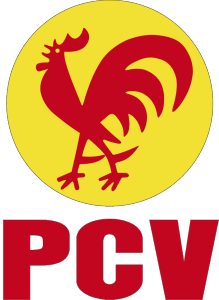
The Communist Party of Venezuela is a communist party in Venezuela. Founded in 1931, it is the oldest active political party in Venezuela, and was the country's main leftist party until it fractured into rival factions in 1971. The PCV currently opposes the government of Nicolás Maduro.

The Movement for Socialism, officially the Movement for Socialism – Political Instrument for the Sovereignty of the Peoples, is a socialist political party in Bolivia. Its followers are known as Masistas.

The Movement for Socialism is a democratic socialist political party in Venezuela.
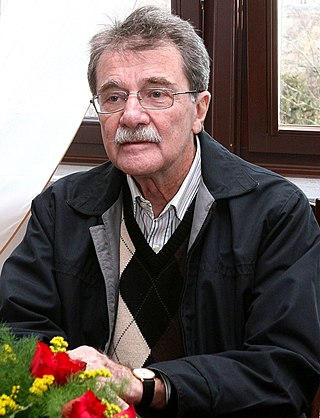
Teodoro Petkoff Malec was a Venezuelan politician, economist and journalist. One of Venezuela's most prominent politicians on the left, Petkoff began as a communist but founded the democratic socialist Movement Toward Socialism party after the 1968 Warsaw Pact invasion of Czechoslovakia. Petkoff was elected as senator and ran for the presidency twice in the 1980s, being defeated both times. As Minister of Planning, he oversaw President Rafael Caldera's adoption of liberalization economic policies in the mid-1990s. He was a prominent critic of President Hugo Chávez and was a candidate to run against him in the 2006 presidential election until he dropped out four months before the vote to support Manuel Rosales. Petkoff launched the newspaper Tal Cual in 2000 and remained its editor until his death in 2018.

The Thousand Days' War was a civil war fought in Colombia from 17 October 1899 to 21 November 1902, at first between the Liberal Party and the government led by the National Party, and later – after the Conservative Party had ousted the National Party – between the liberals and the conservative government. Caused by the longstanding ideological tug-of-war of federalism versus centralism between the liberals, conservatives, and nationalists of Colombia following the implementation of the Constitution of 1886 and the political process known as the Regeneración, tensions ran high after the presidential election of 1898, and on 17 October 1899, official insurrection against the national government was announced by members of the Liberal Party in the Department of Santander. Hostilities did not begin until the 11th of November, when liberal factions attempted to take over the city of Bucaramanga, leading to active warfare. It would end three years later with the signing of the Treaty of Neerlandia and the Treaty of Wisconsin. The war resulted in a Conservative victory, and ensured the continued dominance of the Conservative Party in Colombian politics for another 28 years. Colombia's political structure as a unitary state has not been challenged since.
Más que Amor... Frenesí is a 2001 Venezuelan telenovela that was produced by and aired on Venevisión. It had a total of 105 episodes and was distributed internationally.
The Armed Forces of National Liberation was a Venezuelan guerrilla group formed by the Communist Party of Venezuela to foment revolution against the democratically elected governments of Rómulo Betancourt and Raul Leoni.

Luciano Marín Arango, better known as Iván Márquez, is a Colombian guerrilla leader, member of the Revolutionary Armed Forces of Colombia (FARC), part of its secretariat higher command and advisor to the Northwestern and Caribbean blocs. He was part of the FARC negotiators that concluded a peace agreement with President Juan Manuel Santos. On 29 August 2019, Márquez abandoned the peace process and announced a renewed armed conflict with the Colombian government.

The United Socialist Party of Venezuela is a left-wing to far-left socialist political party which has been the ruling party of Venezuela since 2007. It was formed from a merger of some of the political and social forces that support the Bolivarian Revolution led by President Hugo Chávez.
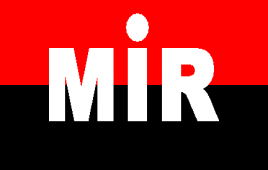
The Revolutionary Left Movement was a left-wing Marxist political party in Venezuela. It split from Acción Democrática in 1960 and became involved in armed guerrilla struggle against the Venezuelan state.
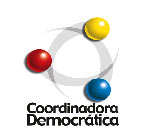
The Coordinadora Democrática was an umbrella group of Venezuelan political parties, civil associations and non-government organisations opposed to President Hugo Chávez. Founded on 5 July 2002, the organization negotiated with the government in November 2002 under the auspices of the Organization of American States Secretary General César Gaviria. The Coordinadora Democrática also helped to organize the Venezuelan general strike of 2002–2003 and the 2004 recall referendum.

Pompeyo Ezequiel Márquez Millán was a Venezuelan politician and former marxist guerrilla member in the 1960s. He was one of the founders of Movimiento al Socialismo (MAS), and part of the opposition to the late Venezuelan president Hugo Chávez. In the 1980s he was a member of the Comisión para la Reforma del Estado (COPRE). In 1989, he was appointed by Carlos Andrés Pérez as a member of the Presidential Committee for Colombian-Venezuelan Border Issues (COPAF) chaired by Ramón J. Velásquez. He was Minister of Borders of the Government of Rafael Caldera from 1994 through 1999.

The second presidency of Rafael Caldera took place from 1994 to 1999. Caldera had previously been President from 1969 to 1974.

Edgar C. Otálvora is a Venezuelan intellectual, journalist, and politician who has held government and diplomatic positions. He is an expert in international politics and economics, and has distinguished himself as an analyst of Latin American topics, with a focus on military, diplomatic, and political issues. He has been a columnist in Venezuelans and Americans newspapers, in addition to directing the newspaper El Nuevo Pais in Caracas from 2006 to 2010. He is a professor at the Central University of Venezuela. He was a close collaborator of former Venezuelan president Ramón J. Velásquez. He has cultivated the biographical genre, being the first to write biographies of the 19th century Venezuelan presidents Raimundo Andueza Palacio and Juan Pablo Rojas Paul, as well as the Colombian president Virgilio Barco Vargas. Columnist in Diario Las Américas of Miami.
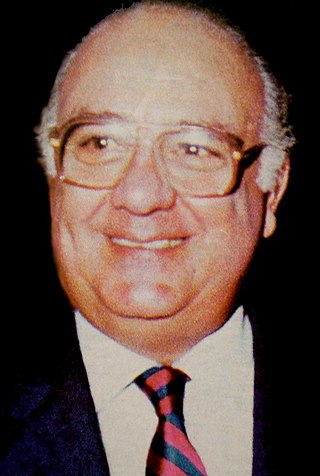
Jaime Lusinchi served as President of Venezuela from 1984 to 1989 for Democratic Action.
Anarchism in Venezuela has historically played a fringe role in the country's politics, being consistently smaller and less influential than equivalent movements in much of the rest of South America. It has, however, had a certain impact on the country's cultural and political evolution.
The Revolutionary Party of the Proletariat (Communist) (Spanish: Partido Revolucionario del Proletariado (Comunista), abbreviated P.R.P.(C)), nick-named 'the Black Communists', was a political party in Venezuela 1947-1952.

Juan Bautista Fuenmayor Rivera was a Venezuelan politician, lawyer, university professor and historian. He was general secretary of the Communist Party of Venezuela (1937–1946) and rector of the University of Santa María University (1977–1989).

Several interventions of political parties in Venezuela have occurred during Nicolás Maduro's government. The interventions are mandated by the pro-government Venezuelan Supreme Tribunal of Justice. During these interventions, the leadership or most of the political party members end up suspended, expelled or replaced by members appointed by the TSJ.
















